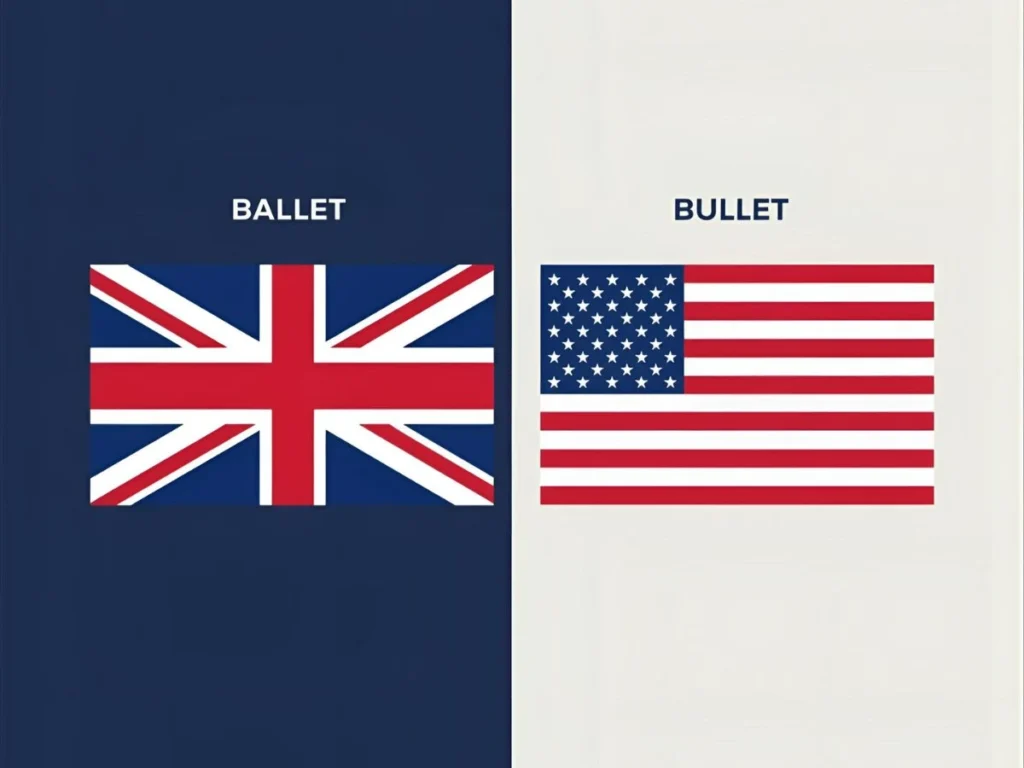The phrase “the ballot or the bullet” grabs attention with its bold imagery. Coined by Malcolm X in 1964, it’s a powerful call to action, urging people to choose voting or confrontation to achieve change.
People search for this keyword to understand its historical context, meaning, or how it applies today. Some may wonder about its origins or how it’s used in modern discussions.
This article clears up confusion by explaining the phrase’s meaning, history, and usage. Whether you’re a student, writer, or curious reader, you’ll learn why this phrase resonates and how to use it correctly. We’ll cover its origins, spelling debates, common mistakes, and real-world examples, ensuring you grasp its significance and application.
The Ballot or the Bullet – Quick Answer

“The ballot or the bullet” means choosing between peaceful voting (the ballot) or violent resistance (the bullet) to achieve justice. For example, Malcolm X used it to highlight the urgency of civil rights: “Give me liberty through voting, or I’ll fight for it.” It’s a metaphor for empowerment and action, often quoted in political or social justice contexts.
The Origin of The Ballot or the Bullet

The phrase comes from Malcolm X’s 1964 speech, “The Ballot or the Bullet,” delivered in Cleveland, Ohio. He argued that African Americans must secure rights through voting or be prepared to fight. The phrase encapsulates the choice between democratic participation and revolutionary action. No spelling variations exist, as it’s a fixed phrase, but its impact has made it a cultural touchstone. It’s widely quoted in history books, speeches, and activism, with no regional spelling differences since it’s a proper noun phrase rooted in American English.
British English vs American English Spelling

Since “the ballot or the bullet” is a specific phrase, it doesn’t vary between British and American English. Both use the same spelling and phrasing. However, related terms like “ballot” or “bullet” follow standard spelling rules. In American English, “ballot” and “bullet” are spelled as is. British English uses the same spellings, as these words don’t involve common spelling differences (e.g., color vs colour). Below is a comparison table for clarity:
| Word | American English | British English | Notes |
|---|---|---|---|
| Ballot | Ballot | Ballot | Same spelling in both. |
| Bullet | Bullet | Bullet | Same spelling in both. |
| The Ballot or the Bullet | The Ballot or the Bullet | The Ballot or the Bullet | Fixed phrase, no variation. |
Which Spelling Should You Use?
Use “the ballot or the bullet” exactly as written, regardless of your audience. It’s a proper phrase, not subject to regional spelling changes. For American, British, or global audiences, maintain the original wording to preserve its historical and cultural weight. If you’re writing for a specific context, like academic papers or social media, ensure the phrase is quoted accurately to respect its origins. For example, a British writer discussing civil rights history should use the phrase as Malcolm X intended, without alteration.
Common Mistakes with The Ballot or the Bullet
- Misquoting the Phrase: Some write “ballot or bullet” without “the,” losing its formal tone. Always include “the” for accuracy.
- Misattribution: Crediting the phrase to others, like Martin Luther King Jr., is incorrect. It’s Malcolm X’s.
- Context Errors: Using it casually (e.g., “I’ll vote or fight for pizza”) dilutes its serious tone. Reserve it for political or justice-related discussions.
- Capitalization: Some capitalize “The Ballot or The Bullet,” but only the first “The” needs capitalization unless quoting the speech title.
Correct these by verifying the source and context before using the phrase.
The Ballot or the Bullet in Everyday Examples
- Emails: “In our campaign, we echo Malcolm X’s ‘the ballot or the bullet’ to stress voting’s power.”
- News: “Protesters referenced ‘the ballot or the bullet’ to demand systemic change.”
- Social Media: A post on X might say, “2025 elections are critical—remember ‘the ballot or the bullet’! Vote for change.”
- Formal Writing: “Malcolm X’s ‘the ballot or the bullet’ speech remains a cornerstone of civil rights rhetoric.” These examples show the phrase’s versatility in serious discussions about democracy and activism.
The Ballot or the Bullet – Google Trends & Usage Data
Google Trends shows steady interest in “the ballot or the bullet,” peaking during U.S. election cycles or civil rights discussions. It’s most popular in the United States, especially in urban areas with strong activist communities. Globally, searches spike in countries like Canada and the UK during political events. On X, the phrase appears in posts about voting rights, racial justice, or political empowerment, often with hashtags like #CivilRights or #Vote. Its usage is tied to moments of social or political tension, reflecting its enduring relevance.
Comparison Table: Keyword Variations
| Phrase | Correct Usage | Incorrect Usage | Notes |
|---|---|---|---|
| The Ballot or the Bullet | ✓ | Official phrase from Malcolm X. | |
| Ballot or Bullet | ✗ | Missing “the” reduces formality. | |
| The Ballot or The Bullet | ✗ | Over-capitalization is incorrect. | |
| Ballots or Bullets | ✗ | Plural form changes meaning. |
FAQs About The Ballot or the Bullet
- What does “the ballot or the bullet” mean? It means choosing between voting for change or using force to achieve justice, as per Malcolm X’s speech.
- Who said “the ballot or the bullet”? Malcolm X coined the phrase in his 1964 Cleveland speech.
- Is there a spelling difference in British vs American English? No, the phrase is identical in both, as it’s a fixed quote.
- Can I use the phrase in casual writing? Avoid casual use; it’s best for serious political or social justice contexts.
- Why is the phrase still relevant? It resonates in discussions about voting rights, systemic inequality, and activism.
- How do I cite the phrase correctly? Attribute it to Malcolm X and use “the ballot or the bullet” with proper capitalization.
- Where can I read the full speech? The speech is available in history books or online archives, like university websites or civil rights collections.
Conclusion “The ballot or the bullet” is more than a phrase—it’s a powerful reminder of the choices people face in the fight for justice. Malcolm X’s words continue to inspire, urging action through voting or, if necessary, resistance. This article clarified its meaning, origin, and correct usage, ensuring you can use it confidently in writing or discussions. Whether you’re addressing an American, British, or global audience, the phrase remains unchanged, carrying its historical weight. Avoid common mistakes like misquoting or misattributing, and use it in contexts that honor its serious tone. From social media to academic papers, “the ballot or the bullet” remains a call to action. Next time you reference it, you’ll do so with clarity and respect for its legacy.

I am Maya Brooks, a passionate writer and language enthusiast at Grammexa.com, where words are explained with clarity and purpose.
I am dedicated to simplifying confusing terms, comparisons, and grammar topics for readers worldwide.
I am here to help you learn smarter, write better, and understand language with confidence.



